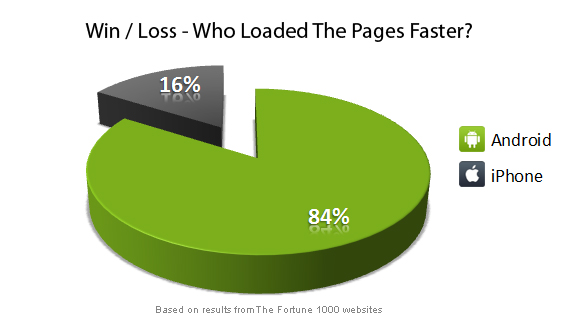Update (10:45pm): As pointed out by our readers' comments, there seems to be an inherent flaw to the way iPhones were benchmarked. Apple claims the embedded browser environment that was used for this test doesn't have all of the Mobile Safari's performance optimizations that include JavaScript, asynchronous page-loading and HTML5 caching.
- Original story is below -
The largest-ever research study of smartphone browser performance, with over 45,000 measurements on the latest iPhone and Android devices, has found that Android was 52 percent faster than the iPhone, on average. The purpose was to determine which of the two leading smart phone vendors has the fastest browser, according to Blaze.
Android finished loading a webpage faster on 84 percent of the 1000 Websites tested. The study also found that the despite significant JavaScript performance gains in the latest Apple iOS 4.3 release and Google Android 2.3 releases, these improvement made no measurable improvement on the actual page load times of the sites tested.

The study used real phones on real-world websites to make the measurements. Past studies have often used fabricated benchmark sites or manual measurements on a small number of sites. The company developed custom apps for the mobile devices (iPhone 4 with iOS 4.2, iPhone 4 with iOS 4.2, Galaxy S with Android 2.2, and Nexus S with Android 2.3), which loaded a page on demand and measured how long it took.
"We were very surprised by the results", Guy Podjarny, Blaze CTO and co-founder, said in a statement. "We assumed that it would be closer race and that the latest JavaScript speed improvements would have a more material impact on performance. The fact that Android beat iPhone by such a large margin was not expected".
https://www.techspot.com/news/42877-android-52-faster-than-iphone-in-browsing-speed.html